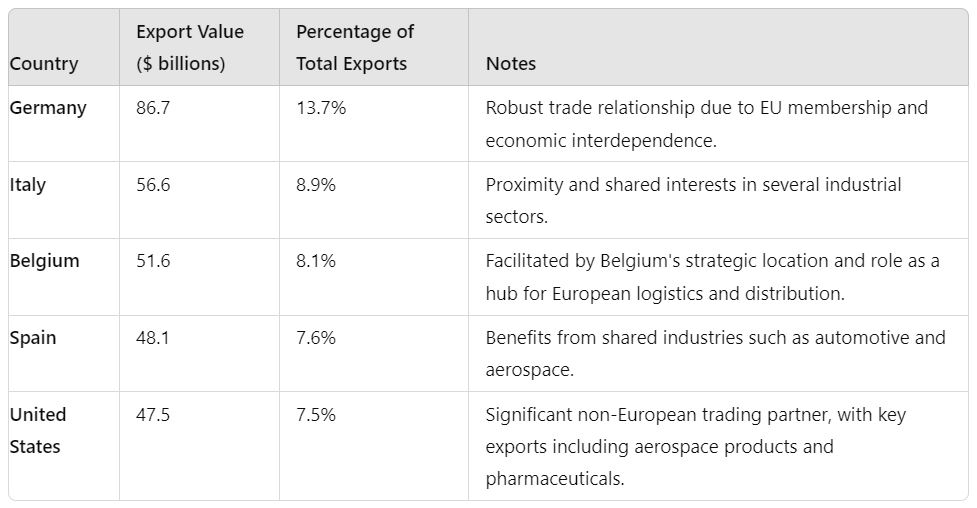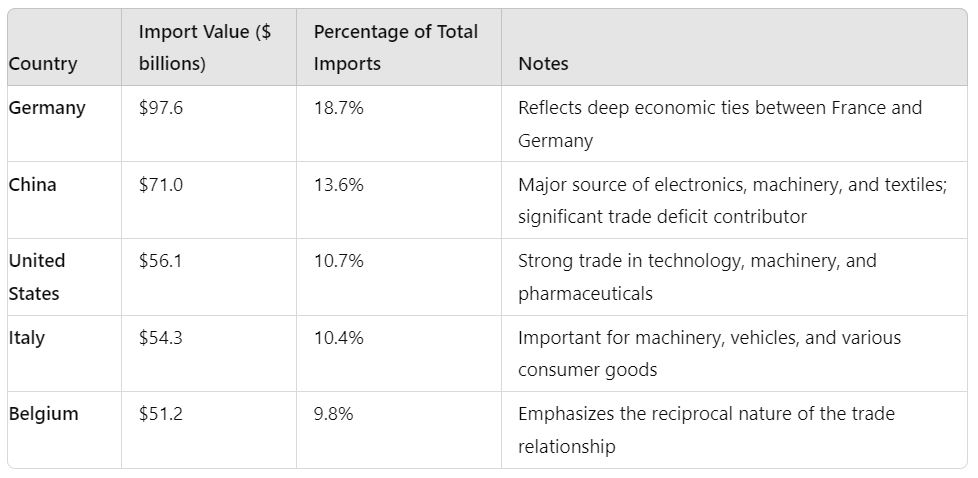
France continues to play a significant role in international trade. Its trade dynamics reflect both traditional partnerships and evolving trends. Below is an overview of France’s top trading partners, highlighting the significance and volume of trade with each.
Top Export Partners
- Germany: Leading the list, Germany accounts for approximately 13.7% of France’s total exports. In 2023, France exported goods worth $86.7 billion to Germany, reflecting a robust trade relationship rooted in both countries’ membership in the European Union and their economic interdependence.
- Italy: Italy is the second-largest recipient of French exports, with trade amounting to $56.6 billion, making up 8.9% of France’s total exports. The proximity and shared interests in several industrial sectors strengthen this partnership.
- Belgium: Belgium imported $51.6 billion worth of goods from France, representing 8.1% of France’s exports. This trade is facilitated by Belgium’s strategic location and its role as a hub for European logistics and distribution.
- Spain: With exports totaling $48.1 billion, Spain accounts for 7.6% of France’s export market. The two nations benefit from shared industries such as automotive and aerospace.
- United States: The US is a significant non-European trading partner, importing $47.5 billion worth of goods from France, which constitutes 7.5% of France’s exports. Key export items include aerospace products and pharmaceuticals.
Top Import Partners
- Germany: Not only a top destination for French exports, Germany is also France’s largest import partner. In 2023, France imported goods worth $97.6 billion from Germany, showcasing the deep economic ties between the two nations.
- China: France imported $71 billion worth of goods from China, underlining China’s importance as a source of electronics, machinery, and textiles. However, this relationship also contributes significantly to France’s trade deficit.
- United States: Imports from the United States totaled $56.1 billion, reflecting strong bilateral trade in sectors such as technology, machinery, and pharmaceuticals.
- Italy: Italy remains a crucial partner for imports as well, with France importing goods worth $54.3 billion, including machinery, vehicles, and various consumer goods.
- Belgium: France imported $51.2 billion worth of goods from Belgium, emphasizing the reciprocal nature of their trade relationship.
Trade Deficits and Surpluses
France’s trade balance reveals both challenges and opportunities. The country recorded an overall trade deficit of $93.9 billion in 2023, a significant reduction from previous years. The largest trade deficits were with China ($50 billion), Belgium ($13.6 billion), and Germany ($10.9 billion). On the other hand, France enjoyed substantial trade surpluses with countries like the United Kingdom ($11 billion), Singapore ($8.1 billion), and Hong Kong ($5.2 billion).
Continental Trade Distribution
A large portion of France’s trade is concentrated within Europe, with approximately 66.8% of exports and 62.5% of imports involving European countries. This is followed by significant trade volumes with Asia (17.1% of exports, 22.4% of imports) and North America (8.8% of exports, 9.3% of imports).
Emerging Markets and New Partnerships
In 2024, France is also focusing on tapping into emerging markets such as India, Brazil, and Vietnam. These countries are showing promising economic growth, and France aims to establish stronger trade relations to benefit from new opportunities.
Sustainable Trade Practices
France is increasingly prioritizing sustainability in its trade policies. The country is pushing for greener supply chains and environmentally friendly practices among its trading partners. This includes efforts to reduce carbon footprints and promote the use of renewable energy sources in production and transportation.
Technological Innovations
France is leveraging technological advancements to enhance its trade capabilities. The adoption of AI, blockchain, and IoT in logistics and supply chain management is helping to streamline operations, improve efficiency, and reduce costs. These innovations are expected to further solidify France’s position as a major player in global trade.
Government Initiatives
The French government continues to support exporters through various initiatives, including financial aid, export guarantees, and market research assistance. These measures are aimed at helping French businesses navigate the complexities of international trade and seize new opportunities in the global market.
Conclusion
France’s trade relationships underscore the importance of both European partners and global connections. The country’s strategic focus on maintaining and expanding these relationships is crucial for sustaining its economic growth and addressing trade imbalances. As global trade dynamics continue to evolve, France’s ability to adapt and strengthen its trade policies will be vital for its economic resilience and prosperity.
Connecta can further assist you in exporting or importing in France by providing a comprehensive platform for networking, resources, and logistical support. We facilitate smooth transactions, ensuring that businesses can efficiently navigate the complexities of international trade. This support enhances their global reach and operational success, making Connecta an invaluable partner in achieving international business objectives.











